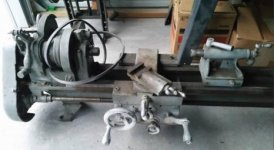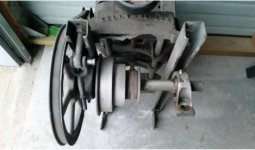How to install the app on iOS
Follow along with the video below to see how to install our site as a web app on your home screen.
Note: This feature may not be available in some browsers.
You are using an out of date browser. It may not display this or other websites correctly.
You should upgrade or use an alternative browser.
You should upgrade or use an alternative browser.
Can anyone identify this lathe?
- Thread starter scottyydo
- Start date
- Replies 17
- Views 2,058
Billtodd
Titanium
- Joined
- Feb 8, 2009
looks like one of the many copies of the southbend 9 inch
looks like one of the many copies of the southbend 9 inch
That is what I thought too. I am considering buying it to refurbish, but wanted to know what it was to I could do a little research before and see what I was in for as it comes with no tooling at all and has been taken apart so i cannot test it.
Jeffrey Caldwell
Plastic
- Joined
- May 20, 2019
What was/is the asking price on this little guy?
M.B. Naegle
Diamond
- Joined
- Feb 7, 2011
- Location
- Conroe, TX USA
Does it come with anything else? Does he have the counter-shaft assembly? I sold a similar 9" south bend lathe a couple years back with no counter-shaft, very limited tooling, and it was the change gear type, for $250. For $550, I'd expect to find a bench-top lathe with the countershaft assembly and a quick-change gear-box.
Scott, what are you plans for the lathe usage wise?
I have an old Sebastian or Sebastian May 10" lathe with 4' bed I'd sell. And it looks like you are kind of local. Its mostly there. Have the countershaft. No change gears and may be missing the compound (can't recall).
Have some extra motors and such as well. Maybe some tooling.
Would be talking less $ all together, but may not be as capable as this one in the end. Let me know if you'd be interested. (I'm near Sedalia, but I think I've seen that lathe advertised in KC. I'll be through KC one day this weekend if it helps.)
I have an old Sebastian or Sebastian May 10" lathe with 4' bed I'd sell. And it looks like you are kind of local. Its mostly there. Have the countershaft. No change gears and may be missing the compound (can't recall).
Have some extra motors and such as well. Maybe some tooling.
Would be talking less $ all together, but may not be as capable as this one in the end. Let me know if you'd be interested. (I'm near Sedalia, but I think I've seen that lathe advertised in KC. I'll be through KC one day this weekend if it helps.)
I have some small projects planned but really 1) I love learning how to do new things and making things with my hands. 2) I like refurbishing old machines. Honestly, I was planning to buy a Grizzly hobby lathe to learn on until a week ago. I am really looking for a complete machine that might need some clean up (according to me). I am not ready to buy yet as my wife is already starting to raise eyebrows about the current projects in the basement (not to mention the woodshop in the detached garage.)
That's your countershaft and motor. Used for speed changes on the spindle.
No quick change on this one. Loose change gears for threading.
If your not threading, you can get away without them. They can be had, but not cheap. Best to get them when you buy one if you are going to need them as they are about free when they come with a lathe. Easily misplaced, but necessary parts =$$.
Easily misplaced, but necessary parts =$$. 
No quick change on this one. Loose change gears for threading.
If your not threading, you can get away without them. They can be had, but not cheap. Best to get them when you buy one if you are going to need them as they are about free when they come with a lathe.
 Easily misplaced, but necessary parts =$$.
Easily misplaced, but necessary parts =$$. 
five-hundred and fifty dollars
My advice is don't buy anything with flat belts or plain bearings. Save your money for a Logan or something like it. In the same class but you can get parts and they use real bearings.
My advice is don't buy anything with flat belts or plain bearings. Save your money for a Logan or something like it. In the same class but you can get parts and they use real bearings.
I am looking at a Logan tonight. Listed for $1500.
iwananew10K
Diamond
- Joined
- Sep 12, 2010
- Location
- moscow,ohio
Very nice, but too far for me. Also, I am looking for something smaller as I have to carry it down to basement on an old rickety staircase with a 90 degree turn at the top of the stairs.
Easier to advise if you can advise us what you want to do with the lathe.
There are lots of opinions, and most of them are right if given the right scenario. A Ferrari is awesome as a car, but would suck on the Rubicon and isn't a very good daily driver.
I mostly have smaller projects in mind (under 6x12in) small metal table legs, some smaller items like brass tubes and pens and want to experiment with tool making and various other small things. I would eventually like to make some watch cases but that will take lots of skills I don't have yet.
Most of what you described would be low power and low precision work. Most any lathe would do that including antique flat belt lathes. The newer lathes give give more power and RPM for working faster. Great for production, but not a big difference for a home shop.
The watch cases... Don't know much about them. I hear watches and think precision, but maybe cases are different. Still, makes me think Hardinge.
Do you plan to do any threading? If not, change gears, quick or otherwise, aren't really needed.
I'd say buy what you like, but if the budget starts going up, maybe look for an older Hardinge or Cataract perhaps. Though I am a bit biased toward starting on a flat belt machine as a beginner as it will slip easier than a gearhead in a crash. They are also simpler machines that can be relatively easily and cheaply repaired if a part does break. The early vestiges of the "self replicating 3D printer." Works great in a home shop and terrible in a production environment where downtime is lost $$.
Works great in a home shop and terrible in a production environment where downtime is lost $$.
The watch cases... Don't know much about them. I hear watches and think precision, but maybe cases are different. Still, makes me think Hardinge.
Do you plan to do any threading? If not, change gears, quick or otherwise, aren't really needed.
I'd say buy what you like, but if the budget starts going up, maybe look for an older Hardinge or Cataract perhaps. Though I am a bit biased toward starting on a flat belt machine as a beginner as it will slip easier than a gearhead in a crash. They are also simpler machines that can be relatively easily and cheaply repaired if a part does break. The early vestiges of the "self replicating 3D printer."
 Works great in a home shop and terrible in a production environment where downtime is lost $$.
Works great in a home shop and terrible in a production environment where downtime is lost $$.Similar threads
- Replies
- 0
- Views
- 135
- Replies
- 20
- Views
- 1K
- Replies
- 11
- Views
- 251
- Replies
- 28
- Views
- 2K



